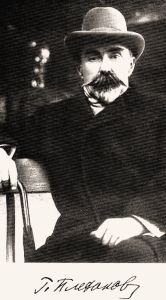Philosopher, political scientist, literary critic
 Born in Tambov, south-west Russia, on 11 December 1856, he was destined for a military career by family tradition and was a cadet in the Voronež cadet corps.
Born in Tambov, south-west Russia, on 11 December 1856, he was destined for a military career by family tradition and was a cadet in the Voronež cadet corps.
In 1876, when he was a student at the St. Petersburg Mining Institute, he joined the populist secret society Zemlja i Volja ("Land and Freedom") and took part in the demonstration in Kazan Square in the same year.
In 1879, when Zemlja i Volja split up, Plechanov was one of the founders of Cërnyj Peredel ("Redistribution of Black Lands"), which called for agrarian reform and thought it could be achieved through propaganda and education of the peasants and therefore condemned the Narodnaya Volja's choice of terrorist methods of struggle. These organisations, belonging to the populist movement, aimed to focus the revolutionary struggle on peasant action led by intellectuals.
Participation in these populist groups forced Plechanov into exile in Paris in 1880. He worked as a publicist for a living: after collaborating with the Blanquists (followers of Louis-Auguste Blanqui), he began to study Marxism and became a fervent propagandist for it. His first Marxist text was the introduction to the second Russian edition of the Manifesto of the Communist Party.
He emigrated to Geneva in 1883 and founded the "Emancipation of Labour" group, which was the first Russian Marxist organisation. In that same year Plechanov wrote the pamphlet "Socialism and Political Struggle", which was considered by Lenin's generation to be the Russian equivalent of Marx and Engels' Manifesto.
In the early years of the 20th century he moved away from Leninism, believing that a capitalist phase was necessary in Russia.
To cure himself of consumption in a less harsh climate than in Switzerland, he moved to San Remo in 1908 where his wife, Rosalija Bograd, a doctor, opened a nursing home for Russian clients at Villa Victoria, later Villa Le Repos.
In San Remo, Dr Bograd was a member of the Committee for the Relief of Russian Emigrants (1912-1915) and of the Society for the Relief of Sick Emigrants in San Remo.
In 1913 the couple were guests of Maksim Gor'kij on Capri.
Plechanov returned to Russia at the time of the 1917 revolution, which he did not support, considering it premature, and supported Kerensky's Mensheviks.
He persuaded his wife to return home, despite the good performance of the San Remo clinic, which was liquidated in 1919, after her husband's death in Jalkala, a sanatorium near St Petersburg on 30 May 1918.
(sources "Sanremo e l'Europa, l'Immagine della Città tra Otto e Novecento" edited by Letizia Lodi; ediz. Scalpendi, 2018; Wikipedia )




